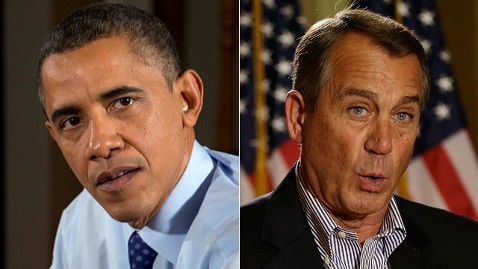Boehner: Obama 'Slow-Walking' to 'Fiscal Cliff'

Carolyn Kaster/AP Photo; Pablo Martinez Monsivais/AP Photo
Original Post at 11:41 a.m. ET; Updated at 12:31 p.m.
Only 21 days before a slate of abrupt tax increases and steep spending cuts are set to take effect, House Speaker John Boehner told fellow lawmakers that the White House has not been serious with proposals for spending cuts and accused President Obama of trying to "slow-walk" the process.
"Where are the president's spending cuts? The longer the White House slow-walks this process, the closer our economy gets to the cliff," Boehner said on the floor of the House of Representatives.
While the party leaders remain locked in a stalemate over tax rates, the speaker has apparently moved his attention to other aspects of the package, calling on the president to present a specific slate of cuts in order to get the negotiations moving toward a deal.
Boehner and Obama met in person for the first time in more than three weeks on Sunday Dec. 9.
"It was a nice meeting, it was cordial, but we're still waiting for the White House to identify what spending cuts the president is willing to make as part of the 'balanced approach' he promised the American people," Boehner told colleagues.
The Republican offer made last week included half the revenue increases - $800 billion versus $1.6 trillion - of an offer President Obama made the week before.
But the president's plan included an additional $50 billion in spending to kick-start the economy. It would cut $400 billion in future spending from government health programs.
Republicans' proposal was heavier on cuts, envisioning cutting $600 billion in future spending from government health programs, cutting $300 billion from mandatory government programs, $300 billion in discretionary government programs and $200 billion by updating the formula by which the Consumer Price Index is calculated, which would affect all sorts of federal programs from Social Security to federal pensions.
"We know the president wants more new 'stimulus' spending and an increase in the debt limit without cuts or reforms," Boehner said. "That's not fixing our problem. Frankly it's making it worse."
Boehner suggested he would not sign on to any plan that did not include more spending cuts.
"I think the members know I'm an optimist. I'm hopeful we will reach an agreement. This is a serious issue and there's a lot at stake. The American people sent us here to work together towards the best possible solution, and that means cutting spending," he said, later adding, "Because right now the American people have to be scratching their heads wondering, 'when is the president gonna get serious?'
Shortly after Boehner concluded his remarks, House Minority Leader Nancy Pelosi hurried onto the House floor to respond to the speaker, referencing pieces of legislation already enacted to substantiate the Democrats' unwillingness to make additional cuts to spending.
"The fact is that the President has, and Democrats agree with him, agreed to… $1.6 trillion in cuts in the Budget Control Act, in other Acts of Congress in this particular Congress," Pelosi, D-Calif, said of the BCA, which was signed into law by President Obama in August 2011 as part of the last debt limit increase. "Where are the cuts? They're in bills that you, Mr. Speaker, have voted for."
Instead, Pelosi called on Republicans to agree to investments in infrastructure and new revenues as "a down payment as we go forward to tax simplification and fairness" next year.
A senior GOP leadership aide speaking on background explained Republicans' position a little further: "Everyone is fixated on taxes. But in order for both sides to reach a balanced approached, Republicans need to see a list of spending cuts and reforms that the president is willing to accept."
While three weeks remain until the "fiscal cliff" hits, most insiders are pressing for a deal sooner rather than later. Whenever an agreement is reached between the top party officials, the deal will have to be put into legislative form, posted online for three days and scored by the Congressional Budget Office before a vote in the House.
Lawmakers and aides hope to avert a last-minute Christmas Eve vote or, worse yet, the need to return to the Capitol after Christmas for legislative business between the holiday and the New Year.